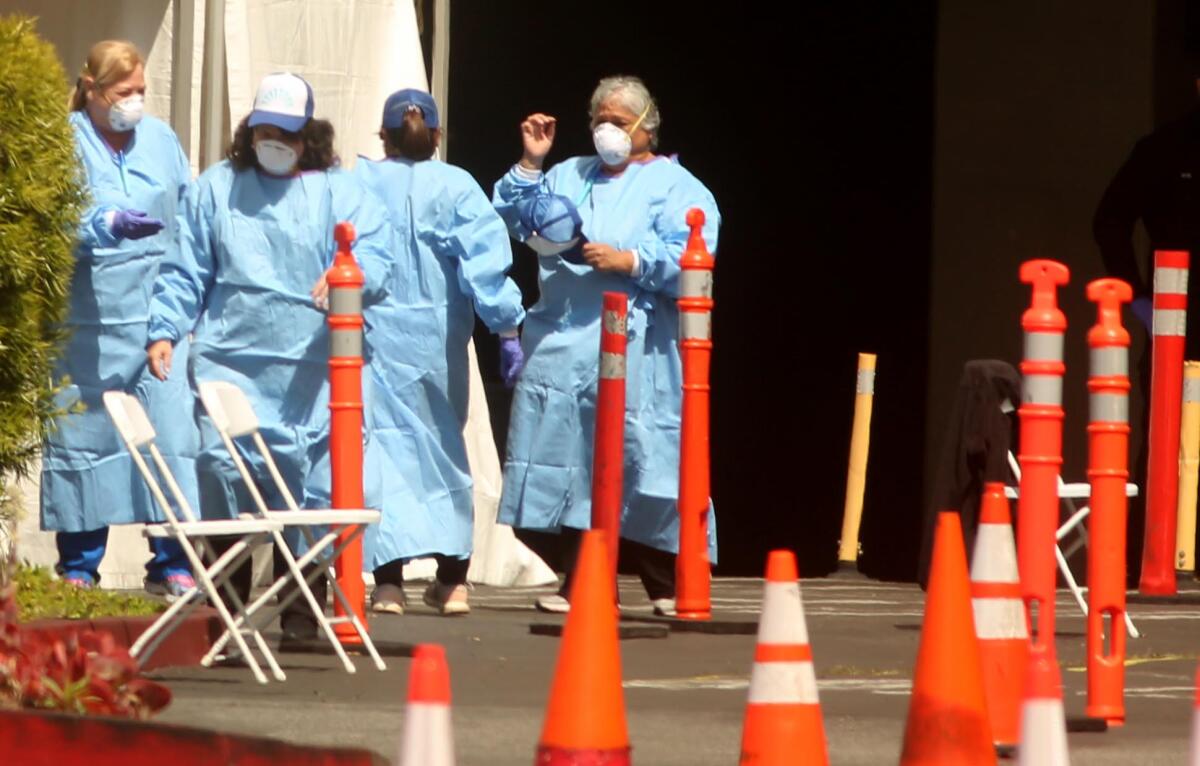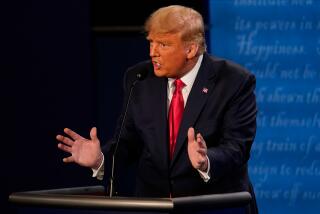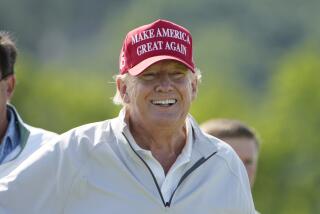COVID Couture. Covidiot. Coronavirus trademark hopefuls flood patent office

The worst pandemic in modern memory has inspired a massive effort to harness intellectual property rights.
More than 1,500 trademark applications have been filed with the U.S. Patent and Trademark Office for variations on the COVID-19 and coronavirus theme.
They range from the serious to the silly, from the innovative to the not so much. Examples abound, and these are just some of the slogans: “She whooped the mess out of the coronavirus, yes she did.” “Be Covidgilant.” “COVID Couture.” “It’s not just clean, it’s COVID clean.” “Covidiot.” “Generation COVID.” “Social Distancing Social Club.”
Intellectual property experts say they’ve never seen anything like it.
“I’ve done some of my own searching just to see what happened during other disasters in the past. And I didn’t find anywhere near this many,” said Jeffrey Pearlman, director of the Intellectual Property & Technology Law Clinic at the USC School of Law. Pearlman said that increases in trademark applications always happen after a significant disaster, “but it is happening at a greater scale this time.”
Dozens of copyright applications also have been filed. Interest in patents probably is up, too, but those applications aren’t published until months after filing.
Experts say there are several reasons for the surge. First is the frightening scale of the virus worldwide, which has captured attention like little else. Also, with workers still barred from returning to their offices, the federal government has boosted its online ability to handle trademark applications and relaxed its usually stringent filing deadlines.
Still another reason is that more Americans have lost jobs more rapidly than at any time since the Great Depression. Many who have kept their jobs have taken pay cuts or been required to take furlough days from work. People are scrambling for ways to make money at a time of scant hiring.
And with most Americans stuck at home, there is ample time to brainstorm ideas.
Some of the applicants have hired intellectual property rights attorneys and appear to be more serious than others, arguing that they want the trademark for various medical products. Other applicants are after a slogan meant to give assurances to customers that their homes or businesses are disinfected and safe.
With health officials bracing for a second wave of infections as restraints on public activities ease, some applications boasting about beating the pandemic are clearly premature. Others are meant to be rallying cries of victory or defiance, or a show of gratitude to first responders and others who have carried on working through the pandemic.
Some, tastefully or not, seem meant to be funny. Others are just vague.
On the serious side, Truvian Sciences is a San Diego start-up that has been raising money to refine what it says will be a low-cost blood testing technology in preparation for submitting it for FDA approval. It recently filed a trademark application for the name “Easy Check COVID-19 IGM/IGG,” which is “an antibody diagnostic test for use in disease detection, namely, Coronavirus (SARS-CoV-2),” according to its May 22 trademark filing.
A trademark application for something called a COVID Wallet was filed by an individual from El Cajon. The description? It’s a wallet. Nothing else is disclosed. The same person is also hoping to trademark an item called a “COVID Key,” described as “a multi-function hand tool comprised of pen, stylus, push rod, door opener, bottle opener, window breaker, screwdriver, hole for key chain, handle,” presumably to avoid coming in contact with frequently touched surfaces, although how the window breaker fits in is anyone’s guess.
An entity calling itself K.O.L.A. Inc., which places its headquarters in Culver City, wants to corner the trademark on “Covid Couch Potato.” A “high intensity interval training fitness workout program” is the only information offered on the required description of goods and services the company intends to offer.
The trademark application for “Straight Outta COVID” isn’t from an individual from Compton looking to play off the famous hip hop video and subsequent movie featuring the musical group N.W.A, but some guy from Hot Springs, Ark., who is, at the very least, ambitious.
Straight Outta COVID, if approved, would be a trademark used on “T-shirts, sweatshirts, bumper stickers, cups, coffee mugs, baseball caps, trucker hats, key fobs, decals, mouse pads, curriculum, TV shows, TV commercials, online graphics and marketing, movies and movie titles, radio commercials, internet commercials, paper and goods made from paper, signs, stickers, art, flags, golf bags, athletic bags, clothing, sweat pants, polo shirts, golf shirts, golf hats, towels, socks, underwear, shoes, beanies,” according to the application.
Plenty of the applications won’t be approved “because most of these are filings from people who probably don’t even understand how trademarks work and just decided to try,” Pearlman said. “Or they are trying to do some sort of land grab thinking it’ll be valuable down the line, not understanding that trademarks don’t work that way.”
As of Tuesday, none of the trademark applications has been approved, and that is because the process is long and potentially expensive, said Irene Y. Lee, a partner at the law firm of Russ, August & Kabat, whose practice involves many aspects of intellectual property, such as patents, trademarks, copyright, trade secrets and right of publicity.
“A trademark, unlike other intellectual property, has to function to help people, consumers and the general public identify the source of goods and/or services being provided. It’s not like buying a domain name and sitting on it,” Lee said.
An applicant can’t just say what the trademark will be used for some time in the future and hope it gets approved, Lee added. The applicant has to be actively engaged in making the product, which will require additional expenses beyond the $225 to $375 trademark application fee, she said.
“In the U.S. in order to get a trademark registered, with very few exceptions, you actually have to show using that trademark in connection with one or more of the goods or services you list it in your application,” Lee said.
And it will take some time before these applicants will even know whether they have a chance of succeeding. “After you file an application, an examiner gets assigned to it, but it doesn’t happen for another three to four months,” she said.
Even if a trademark examiner has no objections to registering the trademark, that is no assurance of success: The filers’ applications can then be opposed by anybody within 30 days of the publication of that trademark application in the “Official Gazette,” a weekly publication of the patent and trademark office.
Any additional filing or paperwork quickly ratchets up the expenses involved, which does a lot to force some applicants to drop out of the process, said Douglas E. Mirell, a partner at the law firm of Greenberg Glusker, who is an expert in intellectual property litigation.
Want a six-month extension for filing a statement of use? Add on another $225. Correcting “a deficiency” in the paperwork is an additional $200. Filing an amendment to bolster your claim? You guessed it; another $200.
Applicants can check on the status of their trademark applications by looking it up on the U.S. Patent and Trademark Office’s Trademark Electronic Search System, which shows all of those recently filed virus-related applications as “Live” or “Dead,” and whether they have gotten to the preliminary stage of receiving a registration number. None of those coronavirus-related trademark applications had received a number yet in a recent search.
“I think it likely will be a fool’s errand for most of those filing the applications, because I really think that it’s quite unlikely that any of them are ultimately going to be registered,” Mirell said, adding that the better description probably than live or dead, in this case, is probably “dead, and not dead yet.”
More to Read
Inside the business of entertainment
The Wide Shot brings you news, analysis and insights on everything from streaming wars to production — and what it all means for the future.
You may occasionally receive promotional content from the Los Angeles Times.










